Pruning Crape Myrtles the Right Way
Make the right cuts to improve the tree’s looks and health
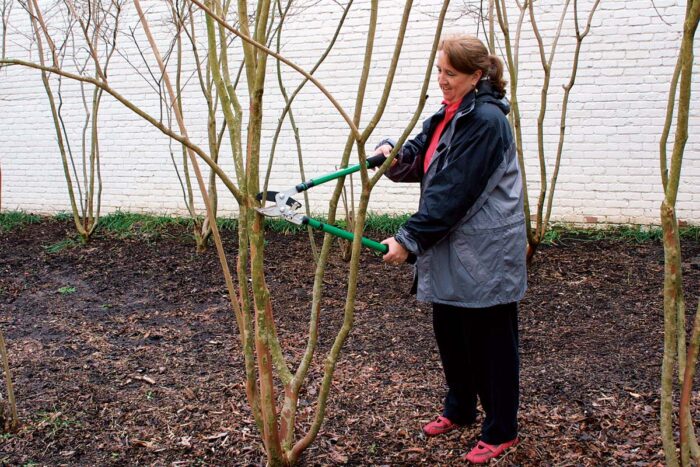
Few flowering plants can compete with crape myrtles (Lagerstroemia indica and cvs., USDA Hardiness Zones 7–9) for vibrant summer color. As a bonus, crape myrtles thrive in heat and humidity and are drought tolerant.
Though many people plant crape myrtles, few people prune them correctly. Correct pruning yields gracefully shaped trees with more blooms that are held upright on strong stems. And flowers arrive earlier than do those on unpruned or mispruned plants.
Crape myrtles bloom on new growth, so prune them in early spring before they break dormancy. Although some gardeners prune their crape myrtles in the fall, I do not recommend doing this. Fall pruning not only creates an unattractive look for winter but also removes the current year’s growth as a buffer against any potential winter damage. Good pruning while crape myrtles are young will mean less maintenance when the trees are older.
Step 1: Start at the bottom
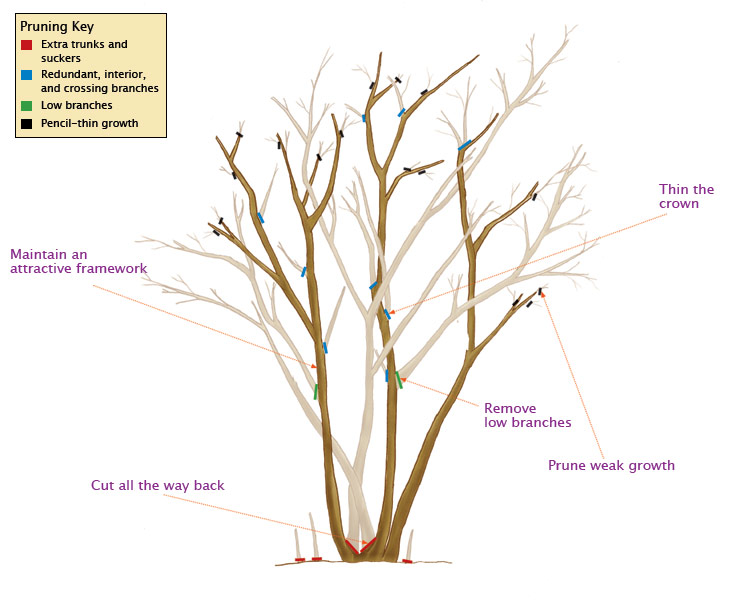
The habit of crape myrtles is to produce multiple trunks, which can cause the plant to get crowded as it matures. A healthy, well-structured crape myrtle will have only a few main trunks. Removing the unnecessary ones first means reducing the overall amount of pruning you need to do.
Maintain an attractive framework
For most crape myrtles, choose three, five, or—at most—seven main trunks. An odd number of trunks is more pleasing to the eye than an even number, which often looks like soldiers in formation. Keep trunks that have ample space to grow and are growing straight and strong.
Cut all the way back
Prune suckers and any additional trunks as close to the soil line as possible. This will avoid leaving a dead stub, which is unsightly and a potential entry for insects and diseases.
 |
Maintain an attractive framework. |
 |
Cut all the way back. |
Remove low branches
I like branching to begin 6 to 8 feet off the ground because it looks better and is more practical. If you don’t need to walk under the branches or see through them to view oncoming traffic, you can allow the branching to start lower. Prune unwanted low branches all the way back to the main trunk.
Step 2: Finish at the top
 |
 |
The upper branches look best if they spread in different directions, so remove any that are growing into an area already occupied by another branch. Make your cuts slightly above a bud that faces the direction in which you want your new branch to grow. Also remove limbs that cross back through the plant or rub against each other. Wind movement and growth can cause these branches to wound each other, and you will eventually lose one or both.
To allow better air circulation and sunlight penetration, which will reduce the potential for diseases like powdery mildew, remove excess branches in the interior of the plant.
Prune weak growth
Your final cuts will be to prune out any branches or stems smaller in diameter than a pencil. Leaving wood that small on the tree results in weak new growth, which will have a difficult time supporting any flowers.
The results of poor pruning
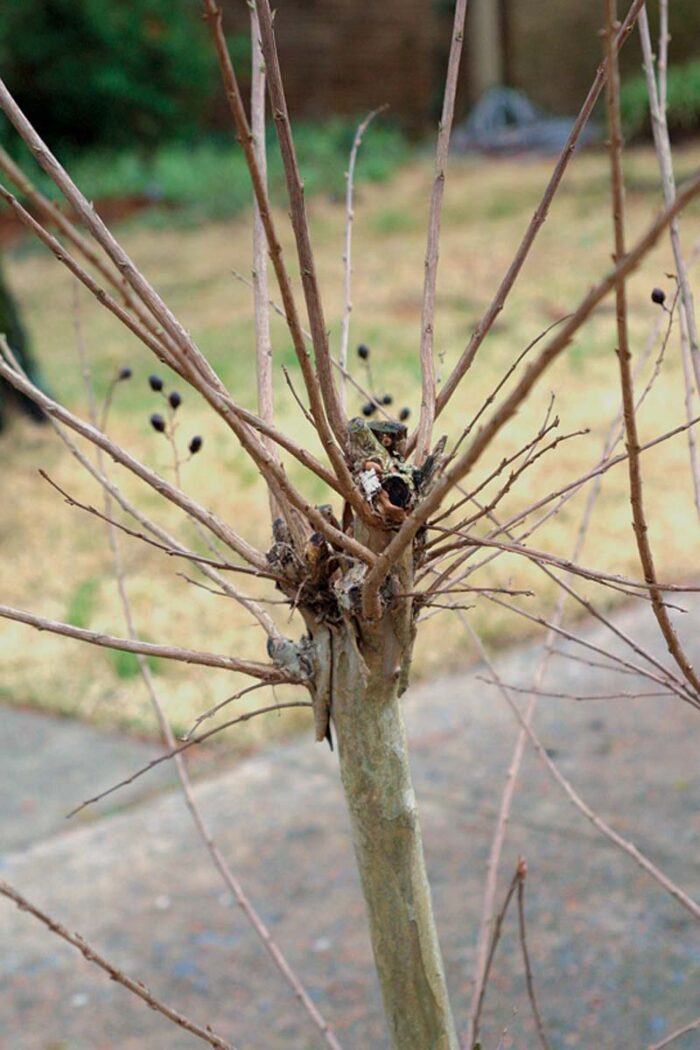
Crape myrtles have the potential to be wonderful small trees if they aren’t chopped to their knees annually. Luckily, crape myrtles are resilient and can tolerate the topping or shearing that some folks insist on giving them. Here are the downsides to pruning a crape myrtle back to an ugly 3- to 4-foot nub every year.
Weak branches: Severe pruning encourages rapid new growth (photo right) with large flower heads. Unfortunately, the new branches are so long and weak that they can’t support the weight of the flowers. Sometimes the branches snap off under the weight.
Fewer blooms: Allowing too many trunks to grow or cutting the plants back too far will result in a shrubby plant whose densely packed foliage produces fewer, later blooms and is more susceptible to powdery mildew.
Unremarkable bark: Shearing crape myrtles prevents the trunks from maturing enough to develop the outstanding peeling and colored bark many varieties have. This “coming of age” for crape myrtles provides as much interest in the winter landscape as the flowers do in summer.
Sharp pruners are essential
Before tackling a pruning project, make sure that your tools are clean and sharp.
Fine Gardening Recommended Products
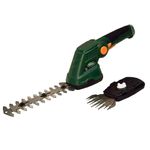
Scotts Cordless Grass-Shear/Shrub-Trimmer Combo
Fine Gardening receives a commission for items purchased through links on this site, including Amazon Associates and other affiliate advertising programs.
- 13.5 x 3 x 5 inches
- Uses a 7.2-Volt 2Ah high-capacity built-in lithium-ion battery; Includes a fast charger
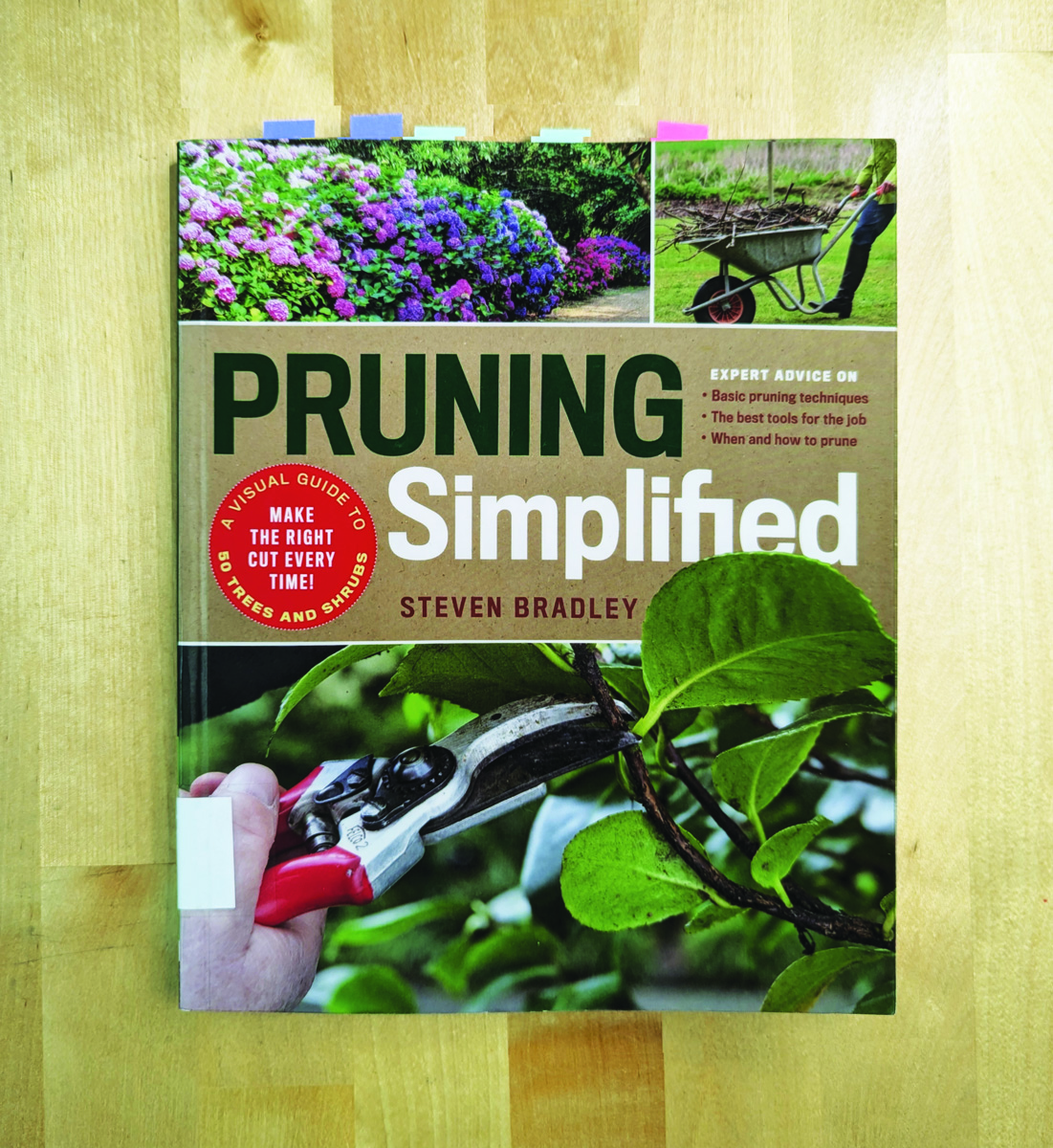
Pruning Simplified: A Step-by-Step Guide to 50 Popular Trees and Shrubs
Fine Gardening receives a commission for items purchased through links on this site, including Amazon Associates and other affiliate advertising programs.
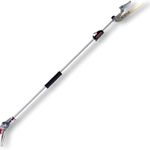
ARS Telescoping Long Reach Pruner
Fine Gardening receives a commission for items purchased through links on this site, including Amazon Associates and other affiliate advertising programs.

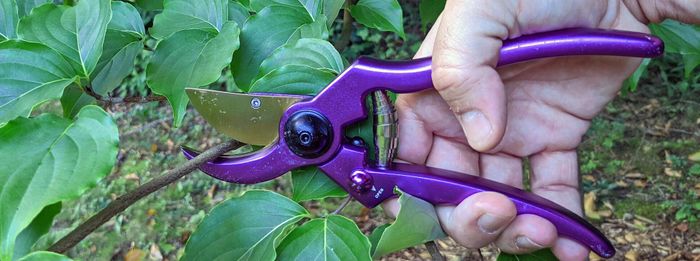
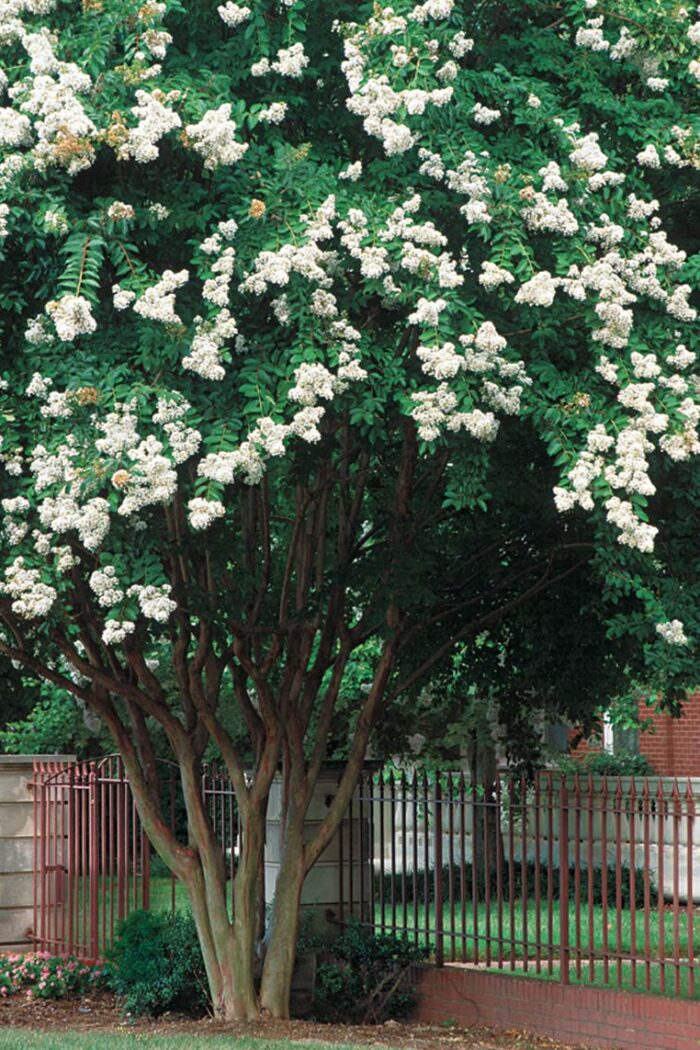




Comments
My Mrytles are overly droopy. Even the slightest rain weighs them down. They also have this fungus on the blooms. What to do?
Spray with something like Safer fungicide. Or, you can use a mixture of baking soda and water to control mildew.
I live in southern New Jersey and ever since Hurricane Sandy 2 years ago my Crape Myrtle hasn't flowered. The ground was covered by salt water from the bay. All the leaves are healthy looking. Could you please tell me what to do because this tree was given to me by my Dad and he has since passed away?
hey! You should clear out anything that is on top of the soil around the tree... as far out as the branches. There should be a perfect circle around the trunk of top soil. Remove any of those rocks out of the way and allow the water to get in... I would put some Miracle Grow on top of the circle and let it settle in... it is high in nitrogen and should help the growth. Best of luck - keep the circle free of debris and top it often with top soil / potting soil!
You have aphids. I use bayer advanced with merit in June.
I just planted 5 crept myrtles for covererage from loud noisey neighbors who just moved in partiers! and they r 15 ft ! My yard already has crept myrtles but smaller(10 ft) I put the 15 ft between them so they will grow side by side to make a thick coverage my question is because there 15 ' will they grow tall with less thickness at the bottom where I need coverage? My 10' ones r thick all around top and bottom? If so how can I prune them to make them be thicker for coverage instead of taller.
How do I prune a 40 foot crape myrtle tree?
I had a tall crepe myrtle that I had to prune the first February after I moved in, two years ago. It's hard to tell from what you said without seeing a picture, but usually there are branches that start about 8 feet and go up from there. Start by pruning those really high ones all the way back to the main trunk. Also, the tips in the article are very helpful: https://www.finegardening.com/pruning-crape-myrtles#ixzz3NJ4H0gm5
You link didn't take me anywhere and I have the same problem. We bought our house 2 years ago and I not know what these were called or what to do with them, but knew they were way to over grown and had been neglected. I would really like t oknow what to do to fix them before they come out of well hybernation. LOL.
We moved into a house recently with two crepe myrtles that were clearly chopped to the nubs every year. The strong branches go up about 12 feet, and then the entire top is thin scraggly branches shooting off from the "knuckles", which are about 5-6 feet tall and thin with old seed pods. The article mentions that these branches are too weak to support the weight of the flowers. Does this mean, we need to continue chopping these thin branches down to the knuckes every year? Or is there any way to reverse this process?
Rehabilitation
If you want to rehabilitate a "murdered" crapemyrtle, try one of the following options:
Choose the strongest two or three sprouts from each stub and remove the rest. This will encourage the remaining sprouts to grow stronger and will open up the canopy of the tree. If you follow this procedure for a couple of seasons, the tree will improve in health and appearance.
Cut the tree back to within one to two inches of the ground while the tree is dormant. After two to three weeks of growth, select three to five of the most vigorous new shoots on each trunk and remove all others. Remove any new shoots that emerge later. Within three to five years, you will again have a natural-looking crapemyrtle.
from UF/IFAS
I always prune in the fall and it is exceptional when it blooms. When we had a really hard winter 2 years ago it just seemed to rejeuvenate it.
I have a very large Crepe Myrtle and would like to severely prune it. It has about 10 branches from ground up and is about 25 feet high. I would like to take it down at least half way is that possible?
Of course it's possible. You can cut it all the way down to the ground. That is possible too. Don't expect it to survive, but doing it is possible. And if you have the will to do it, and the tools, I'd even say that it's probable.
Crape myrtle will most certainly come back from a renovated crown. They're particularly hard to kill, the crowns being cold hardy to about 50 below.
Please help... i have 2 beautiful crepes a burgandy in the front and a fuscia in the back my neighbor took a chain saw and cut them both while in bloom last September i saw my trees and was,shocked they have not started budding yet please tell me what i should do and will they get buds and bloom this year. Grateful for any advise
Monica, I too am looking for help with this issue. last year my neighbor complained of having to sweep the blooms and when I came home one day, she and her daughter had pruned my trees mid-way. Now they have no blooms for the 2nd year and the buds are black. Can someone please tell me if they can be revived?
Just as an FYI its illegal for your neighbors to prune anything in your yard. No matter the reason
In many states material encroaching over a boundary line is fair game to the offended party. The law considers the remedy to be "in the hand" of the adjacent land owner. While one is not entitled to cut down the encroaching tree one may cut over hanging branches with impunity. Can't take over the neighbor's yard by simply planting a tree.
I have (had?) a beautiful dragon crape myrtle that was about 20 feet, and my gardner just pruned (wacked) it so that there are about 8 branches left, about 6 feet tall, ends cut completely off, no leaves whatsoever. It looks like one of the those sculptures that people put wine bottles on. It is November. We don't get a lot of snow, but it gets cold. Is there any hope for my tree come springtime to 1) grow back and 2) bloom sometime next year? Thanks.
It will come back and it will bloom, but it will just have small, new branches that have blooms. Make sure he doesn't do that again, and start letting some of the small new branches grow bigger each year. Crepe myrtles are pretty tough.
Thank you Jane. I'm glad there's hope since it's right by my front door!
Hello, I am considering planting a few crepe myrtles... The 'spent' flowers that get dark and and dried, do I have to remove them each year? What happens to them if I do not cut them away? Thanks!!
question - I pruned my crepe myrtles in late February
and we've had a warm winter. They started to sprout leave and then we had a few freezing night and the leaves are dying. Should I re prune?
We moved to a property with two small and unattended myrtles. the first year we were hear it was too late in the season to do anything for them. Last year I pruned them substantially in late winter with tremendous results. Intending to do something similar this season, I waited until mid February but we went straight to a very warm spring and it does not appear that we are going back to cold. The trees began to sprout out quickly and I worried that I would stunt them if I did anything at all. My question is can I or should I prune them this season? They still have last seasons remnants of flowering should i at least trim that? BTW I am in central Texas if that helps.
I had six 6-ft. Natchez crepe myrtle trees planted last fall and think they should be pruned now, but the landscaper who planted them said he didn't think they needed it yet. I posted a picture of two to ask what you think. Advice? Suggestions?
My myrtles are new and have a top but no branches on the lower section. They are single trunk. How can I encourage more lower branches out of the main trunk?
Im not sure that, that isn't a contradiction? "Severe pruning encourages rapid new growth with large flower heads" and then "cutting the plants back too far will result in a shrubby plant...with fewer , later blooms". Confused.
I do know if I don't prune mine at all they hardly flower. I've left them for a few seasons and this is the result, almost no flowers. So I prune to encourage strong new flowering "canes", this means shortening first year growth and thinning out second year growth to remove crossing branches, then lastly thinning out the remaining shortened first year growth so there aren't too many as this encourages stronger but fewer new canes. Weak growth usually snaps off on its own but I take out anything that looks like it won't make it.
Unfortunately if you don't shorten first year growth quite a lot the tree becomes too tall to prune and you lose the flowers anyway.
So although I don't commit "Crepe murder "as pollarding has become known in the USA I do take those first year growths down to about foot above last years cut and remove a few second year growths then thin the remaining first years or the tree become too bushy. It's the only way I get a decent show of big flower panicles on sturdy new canes.
Pollarding is an art form itself and can be used with Largerstroemia successfully. But to ensure the new flush is not too weak and disease gets in you have to pollard correctly. That means thinning the resulting canes and topping them to a good sized stub of a cane off each pollard. Removing some of those the year after and so on. Many species are very beautifully and practically pollarded. This is especially true for large shade trees in cities where size might be critical. If they grow too tall they can pose a danger to buildings especially in very old cities where the fragile buildings aren't very tall themselves. They also become very difficult or impossible to train later. The wonderful sight of pollarded London plane trees with their giant bright green leaves casting delicious cool shade in the many small and large squares in places like Southern Spain, Greece, South of France etc where people meet, love is found and families eat al fresco is a wonderful sight.
Don't be afraid of pollarding just learn how to do it correctly.
I just planted 3 crepe myrtle that are 3 ft. high.
I live in Az Do I prune them in the spring or wait for the following year. Oh they are bushes not trees.
My crape myrtle look like the photo next to "the results of bad pruning", very dark, almost black nubs where my gardener pruned it. Branches grow off of the nubby area, same as the photo, and it flowers. But I hate the nubby area. Can I, should I, prune below the nubby area? As the photo shows, there is really not much growth below nubby mess! I am 90% sure it is not mold, just dark looking as you can see in the photo. Great article but I don't think it explained what to do about "the results of bad pruning" how to get rid of the nubby area?
I planted 4 crape myrtles 2 yrs ago.. haven’t touched ( pruned) at all. After Im learning it from this site I will do it late winter in SC. But my question is- there are black spots under the leaves and there are flower buds but it never showed full flowers... and they dried and dies so fast!! why there are black spots and how I get rid of it..?! There are other bushes are near by and small flies are all over..?! These flies are eating its flowers..?! lol ??? anyone can help me..!! Thank u bunch! ???
I've pruned a med size (about 6') CM for about 8 years and so now I have main branches that have many new branches coming of at the "nub". Should I continue to cut each one of the many smaller branches coming off the nub or just "start over" by cutting just below the nub? This will leave about 4 or 5 main branches measuring approx 1" in diameter. Thanks. Dick (SC)
Good one!!
Very nice!
I love it!
I also cut my garden's tree for nice look of trees. I really like this post. This information is appreciable.
Very nice!
Very good information! Pruning crape myrtles is essential so you dont commit CRAPE MURDER! https://myperfectplants.com/2014/07/07/crape-murder-she-wrote/
Yeah!!! Good Technique!
Great information, I would recommend it to my friends for them to check out. Thanks for sharing! If you have more time, please visit: powerline io
Great article, because proper pruning is very important! After reading the article, I can confidently, and most importantly properly trim trees!
As a gardener, I can say that the article is very useful and everything is very well described.
Thanks for sharing this information!
Good pruning while crape myrtles are young will mean less maintenance when the trees are older.
slitherio
Your guidance on removing low branches to improve aesthetics and practicality is excellent. The importance of thinning the crown, encouraging proper branch spread, and addressing branches that cross or rub against each other is well-explained. 裝修保險Moreover, the emphasis on removing weak growth to support flower-bearing branches is a crucial aspect of ensuring a healthy and vibrant display.
Oh my goodness! bounces excitedly I just learned the most amazing thing about taking care of my precious crape myrtles! 🌸✨ I had no idea that giving them proper little haircuts was so super important for keeping them happy and healthy! Can't wait to use all these wonderful tips to help my flowery friends bloom their very best! happy dance They're going to look absolutely gorgeous! Thank you sooo much for sharing such helpful advice! 🌿💕
Warmest hugs and flower kisses! 🤗🌺
Pruning crape myrtles the right way keeps them strong, vibrant, and ready to bloom—just like tuning up your ride in Beach Buggy Racing. Trim too much, and you lose performance; trim smart, and you dominate. Whether it’s plants or power-ups, precision makes the difference between a wild mess and victory. https://beachbuggyracing.net/
Pruning crape myrtles the right way keeps your landscape stunning—just like customizing your properties in GTA 6 Mobile! Keep your trees healthy, shaped, and blooming, just as you’d upgrade cars or safehouses. Whether in real life or virtual missions, precision and style make all the difference in your world. https://gta6mobile.net/
Log in or create an account to post a comment.
Sign up Log in